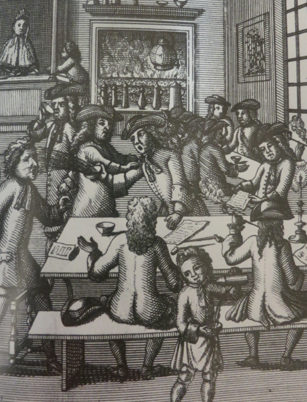The 17th and 18th century coffeehouse was a hub of intellectual and social engagement, where people of relatively diverse social backgrounds could read newspapers, debate and comment on world events, where tradesmen made business deals and where travellers exchanged bits of news. All this is suggested in the Rules and Orders of the Coffee-house, which was published in 1674:
Enter, sirs, freely, but first, if you please,
Peruse our civil orders, which are these.
First, gentry, tradesmen, all are welcome hither,
And may without affront sit down together:
Pre-eminence of place none here should mind,
But take the next fit seat that he can find…
Coffeehouses were known as ‘penny universities’ because customers, including students, artists, writers, merchants and businessmen, were charged a penny as an entrance fee, which covered the drink, newspapers, pamphlets and the latest news and gossip.
Some of the greatest English writers of the 18th century, including John Dryden, Jonathan Swift, Joseph Addison and Samuel Johnson were frequent clients of coffeehouses and their presence attracted customers.

Coffeehouses had vocal supporters and detractors, and numerous pamphlets were published either condemning the drink – for example claiming it caused impotence – or praising its restorative virtues. Satirists criticized the kinds of conversations occurring in coffeehouses: gabbling, gossiping, wheedling and idleness were four attributes thought to be engendered by drinking coffee. Coffeehouses were also, more seriously, potential breeding grounds for political rebellion, where the “seeds of sedition” (A Character of Coffee and Coffee-Houses, published in 1661) were planted. Charles II famously tried to stifle their potential for dissent by issuing a ban on coffeehouses in 1675. The ban was lifted shortly after huge public protests.
Back to Queen Anne Silver Coffee Pot

